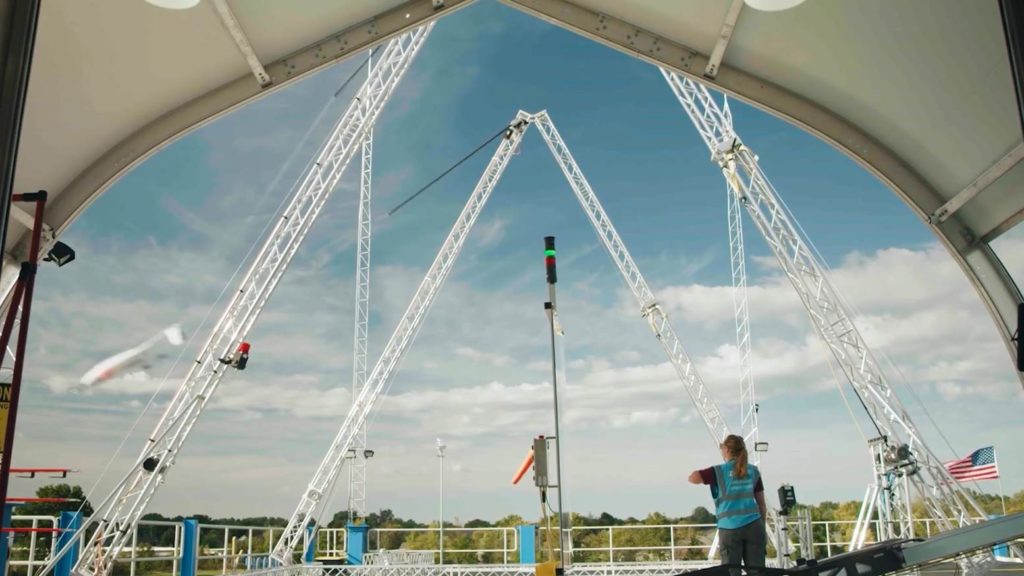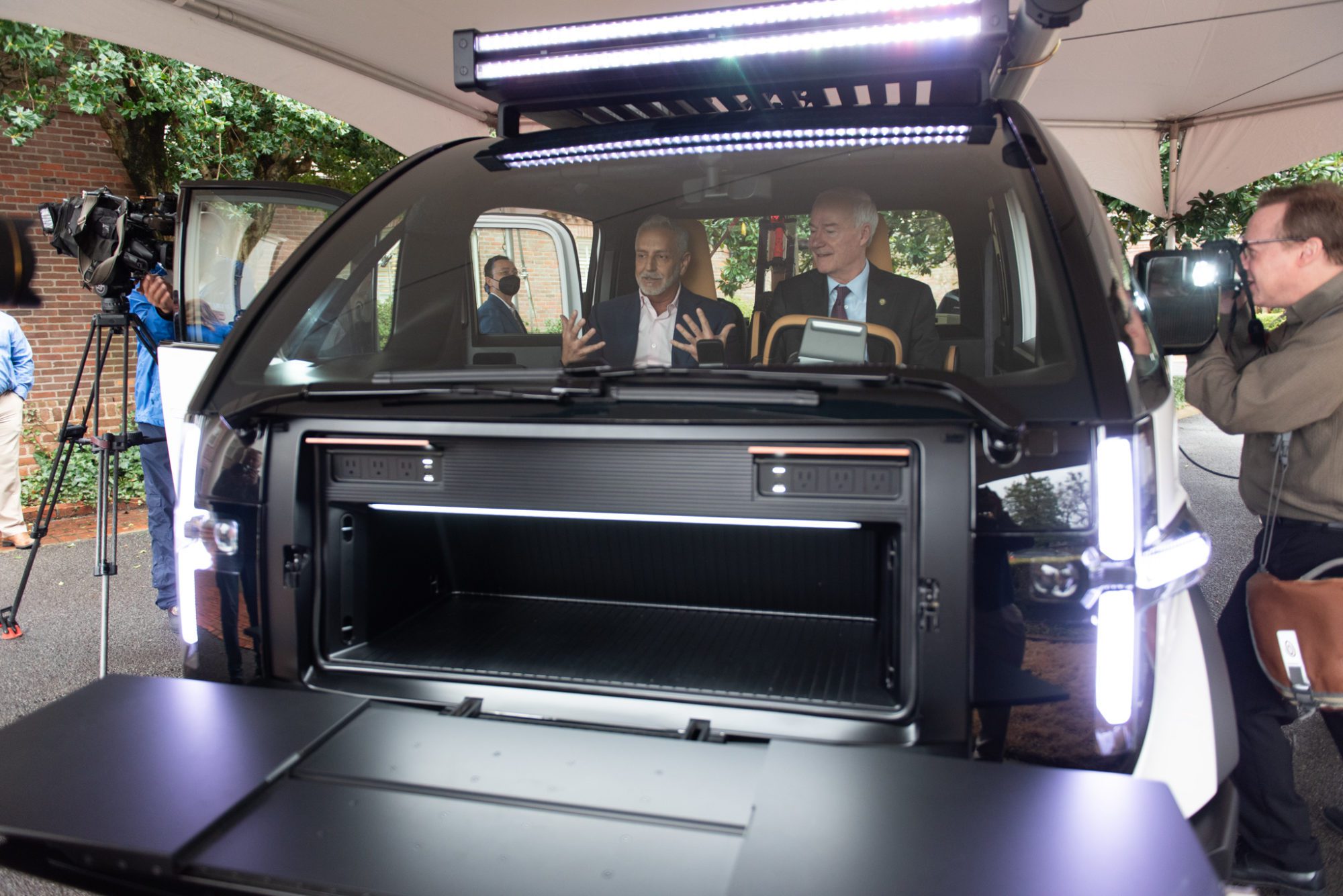Arkansas officials, business leaders and entrepreneurs are making a bold claim to be a global leader in next generation transportation, including flying cars, driverless vehicles and drones. This claim follows Arkansas Governor Asa Hutchinson’s recent announcement to create the Arkansas Council on Future Mobility, an advisory board committed to attracting businesses, startups, innovators and creators.

“This year the nation celebrates the 60th anniversary of John F. Kennedy’s audacious declaration that America would land a man on the moon by the end of the decade, and we succeeded. Our goal is based on that same spirit of innovation, tenacity and entrepreneurship that existed in 1962—we just happen to believe that it’s Arkansas’ turn to lead on that kind of effort,” said Cyrus Sigari, chairman of the Arkansas Council on Future Mobility and UP.Partners Managing Partner. “The state is in an ideal geographic location. It’s the headquarters to powerhouse companies in supply chain, logistics and retail insights. And the support from the state government to incentivize businesses and pioneers in this space makes this claim more than achievable.”
Last fall, Governor Hutchinson forged key global partnerships that will help position Arkansas as a hub for these technologies across a variety of sectors, such as defense.
“Arkansas has been a leader in transportation and mobility for decades. Today we’re continuing to build on that legacy with the Arkansas Council on Future Mobility,” said Gov. Hutchinson. “I recently traveled to Israel to speak of the work we’ve done in Arkansas with legislation passed in 2019 to allow the piloting of autonomous vehicles and the success we’ve seen thus far. Our storied history with the defense sector will also continue to grow in this new and emerging field of technology. The Natural State has the opportunity to become a hub for the future of mobility, and Arkansans are ready to take this challenge head on.”
One rapidly evolving transportation modality is Advanced Air Mobility (AAM), which uses revolutionary aircraft to move cargo and people more quickly, safely and sustainably. The future of AAM will address current supply chain and labor shortage challenges seen across the nation. The trillion-dollar future AAM market will greatly increase the availability of jobs in STEM with over 4,000 new jobs in the state by 2045 and is estimated to create
$3.6 billion in new economic activity and related stimulus. Agriculture, healthcare, defense, consumer goods and other sectors will be the beneficiaries of this initiative.
According to a privately commissioned NEXA Capital Partners report soon to be released, the inclusion of a world-class original equipment manufacturer (OEM) center for development and manufacturing would add over 7,000 full-time jobs to Arkansas’ base case and create an additional $9.9 billion in economic activity. This addition would grow Arkansas’ existing aerospace sector by approximately 25%.
“The commercial and defense industry impacts of AAM cannot be ignored and the market is pushing for thoughtful and rapid deployment,” said Chad Causey, executive director, Arkansas Aerospace & Defense Alliance (AADA). “With a highly skilled aerospace and defense workforce and a burgeoning entrepreneurial spirit, Arkansas can and will capitalize on this future growth. AAM is a natural fit for the Natural State. Arkansas’ aerospace and defense industries appreciates Gov. Hutchinson’s leadership on this issue.”

The industry is already taking hold with Arkansas’ leading companies. Last year, Walmart took to the skies when the retailer announced it would operationalize drone delivery in four stores in Northwest Arkansas in collaboration with Zipline and DroneUp. Today, the retailer has successfully completed hundreds of drone deliveries to select customers in Northwest Arkansas and plans to expand operations in the future.
Another example of transportation progress in Arkansas is autonomous trucking. Walmart and autonomous vehicle company, Gatik, pioneered the use of autonomous refrigerated box trucks in retail operations. Together, the companies have driven more than 200,000 autonomous miles in the state and achieved a worldwide first last year when they removed the safety operator from the driver’s seat.
Electric vehicle technology company Canoo recently announced that it has selected Arkansas as the location for its headquarters, R&D center, and production facility. Canoo will be manufacturing small package delivery vehicles and is expecting to bring over 500 high-paying jobs to Benton and Washington counties.
“We’re excited to experience the benefits of next generation transportation including its convenience, cost-savings and sustainable impact on communities. Our collaboration with both private and public sectors has not only helped us pioneer the use of autonomous vehicles and drones in the state of Arkansas, but in the retail industry as a whole, and it’s only just the beginning,” said John Furner, president and CEO, Walmart U.S.
J.B. Hunt Transport, one of the largest transportation and logistics companies in North America, has long been interested in the role that emerging transportation technologies will play in the future of the industry.
“We’re proud to be among the many people and organizations who envision a future where Arkansas leads the way in testing and implementing next-generation transportation technology,” said Craig Harper, chief sustainability officer and executive vice president at J.B. Hunt. “Collaboration between the public and private sectors will be critical to understanding how electric vehicles, autonomous vehicles and other emerging technologies are implemented. Beyond that, it displays a collective desire and commitment to finding long-term solutions that will impact the transportation industry and ultimately the motoring public.”
With the creation of more jobs available in relevant fields such as electrical and aerospace engineering, manufacturing and IT, student and employee retention are anticipated to increase.
“The University of Arkansas is excited to see this interest and investment in this important growth area,” Dr. Alan Mantooth, University of Arkansas distinguished professor of electrical engineering, said. “As the only institution with a silicon carbide (SiC) research and fabrication facility, and very high research activity, the U of A is uniquely positioned to support this effort with the ability to produce world-class applied research and innovations in power electronics, energy systems, logistics and supply chain, and cybersecurity. The University of Arkansas is proud to be a part of this effort to support the State’s emerging smart mobility sector, providing research, technologies and well-prepared workforce.”
Furthermore, Runway Group has made a multi-million-dollar investment in this initiative. These investments will spark local economic vitality, leading to vibrant and dynamic communities across the state. Arkansas is well-positioned to become a hub for advanced mobility business clusters. The mobility market is expected to attract young startup companies and provide them with tools to prototype, test and scale new technologies and ultimately support their success.
For Arkansas residents, the investment in the future of transportation will bridge the urban-rural divide, allowing for greater connectivity and accessibility across the state. New opportunities will emerge for healthcare, medical suppliers and first responders support by allowing providers to bring medications and supplies to the patient, rather than move the patient to the medicine.
“This effort exemplifies the bold ideas and collaboration transforming Arkansas into a hub for innovation,” said Nelson Peacock, president and CEO of the Northwest Arkansas Council. “As more companies choose Arkansas as the home base for their cutting-edge technologies, these investments will revolutionize our workforce, create jobs and shape an innovative culture that propels the local economy forward.”
Opportunities for applications of mobility technologies will be available across a variety of industries, such as agriculture and timber, infrastructure inspections and tourism. The next-generation technology is also expected to reduce Arkansas’ carbon footprint. By providing cleaner air and quieter streets, The Natural State will benefit from a strong and healthy environment.
Arkansas’ commitment to advancing transportation and logistics has garnered support from organizations across the state, including the State of Arkansas, UP.Partners, Runway Group, Arkansas Aerospace and Defense Alliance, J.B. Hunt, Walmart, the Arkansas State Chamber of Commerce, the University of Arkansas, Northwest Arkansas Council, FedEx, and Entergy. For more information on the Governor’s announcement and the potential social, health, and economic benefits that mobility provides, please visit www.governor.arkansas.gov.
























